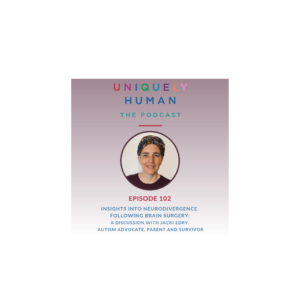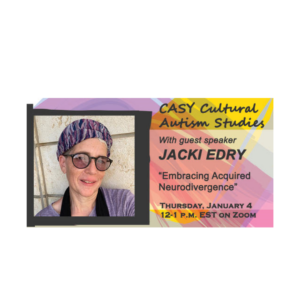
Tune in to The Uniquely Human Podcast
I’m thrilled to announce that recently, I was privileged to be a guest on the renowned podcast- hosted by Barry Prizant, Ph.D., CCC-SLP, and Dave Finch, “The
I am writing this post while feeling quite irate and frustrated after taking my son to the neurologist, who is a specialist in ADHD. His school requires that we go to him for periodic follow-up visits in order for him to continue to receive support services.
Before I get started, I would like to stress that I am in no way attempting to convince anybody that medications for ADHD are always negative. I am sure that everybody knows what works best for them and that there are cases where medications can be extremely helpful. I would simply like to suggest that there are instances where it may be preferable to reconsider the use of pharmaceuticals as the primary solution when attending to people who are experiencing neurologically-based sensory processing issues, or things of the like. I hope that this post will serve as food for thought…especially for medical professionals.
My son has a number of sensory processing issues. One of them is an APD (Auditory Processing Disorder) which interferes with his ability to accurately keep track of what is being said in class. We are currently evaluating a new hearing device to help improve the situation, but as of late he has been coping without one. He loses a considerable amount of auditory input, tires quickly, and has become increasingly frustrated because he is unable to concentrate in class.
From the time he was in second grade, his neurologist has been attempting to prescribe him Ritalin in order to address his concentration issues. Every time we go for a follow-up visit, the doctor has been placing increasing pressure on us to medicate my son. So, now that my son was a teenager, he asked him directly if he wanted to hear about a great pill that would enable him to concentrate- and he agreed.
What followed next was infuriating. I felt as if a pharmaceutical rep was speaking with us, not a pediatric neurologist. He went on a ten-minute, high-speed (even though I explained that he should speak slowly) sales pitch! He made it sound like he can prescribe the magic pill that will solve my son’s attention issues, and glossed over all of the potential negative side effects (which are significant)! He did not let me say a word or ask any questions while he was speaking and concluded his pitch by stating (to my son) that if I did not agree to let him take the medication by the next visit, he would do everything in his power to “convince” me I needed to change my mind.
Now, I am not a doctor- but I do know a thing or two about brains, sensory processing, and medication. And I know that a drug like Ritalin cannot magically make an APD disappear. It will not enable him to hear the words he missed or decipher what is being said in a classroom situation. It cannot cure his other issues either, such as dyslexia or Irlen Syndrome, or regulate his tactile and olfactory senses.
Sensory processing issues interfere with concentration. At first glance, they might appear to be ADHD. But the etiology is different. And, if the attention issues are due to sensory processing challenges, medications like Ritalin will not eliminate them. The only thing that will be beneficial is to address the sensory issues that interfere with concentration and to search for practical solutions to make things easier.
I am certain that no doctor would prescribe aspirin for a bacterial infection, as it can only provide temporary relief from some of the symptoms. In much the same manner, I believe that prescribing medications such as Ritalin to address sensory or auditory processing issues can, at best, only provide a partial solution.
So, please, if you are a medical professional- try to look beyond the initial symptoms and search for the true etiology of the problem. Please try to listen and understand the parents and the child who are seeking your assistance! Do your best to gain familiarity with sensory and neurological processing issues, and with the types of tools that have proven to be helpful (such as Irlen spectral filters, hearing devices and acoustic classrooms, sensory diets, and more). If none of these things lead to improvement, perhaps it might be worth experimenting with medication.
It is misleading to convince people that there are magical pills available that make sensory or neurological processing challenges disappear. Seeking out the best ways to address these issues and creating a dynamic, interactive learning environment are the things that truly help children to reach their full potential and improve their overall quality of life.
Please, take the time to look beyond the diagnostic manuals and the demands of the pharmaceutical industry, in order to help ensure the success and well-being of our future generation.
share this post on

Jacki Edry is a graduate of Hampshire College and has an extensive background in education, writing, and marketing. She has been exploring the world of autism and neurodiversity for over thirty-five years.

I’m thrilled to announce that recently, I was privileged to be a guest on the renowned podcast- hosted by Barry Prizant, Ph.D., CCC-SLP, and Dave Finch, “The

On January 4th, I had the immense pleasure of sharing my presentation, “Embracing Acquired Neurodivergence,” with the CASY Cultural Autism Studies Online Speaker Series. CASY

I’m delighted, excited, grateful, and highly honored to share with you that the incredible Barbara Bensoussan wrote an excellent article about me, my book, and
Moving Forward is a journey between the worlds of autism, neurodiversity, brain surgery recovery, and faith. It provides a rare glimpse into how sensory and neurological processing affect functioning and thought, through the eyes of a professional, parent, and woman who has experienced them firsthand.
Read More
You can also contact me at info@jackisbooks.com